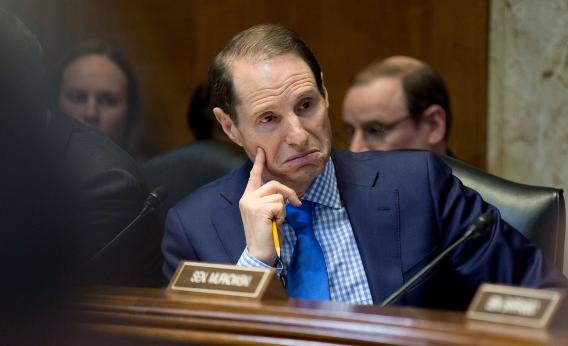Two Senators Have Been Harping on the Obama Administration's Phone Data Collection Policy for Years

Photo by Win McNamee/Getty Images
Glenn Greenwald's scoop that the National Security Agency has been collecting phone data from Verizon customers has some people getting in touch with their civil libertarian side anew, but Sen. Ron Wyden, D-Ore., has been after the NSA on this issue since well before the Obama administration, and his colleague Sen. Mark Udall, D-Colo., has joined him in fighting to uncover the Obama administration's phone record policy.* Here's a roundup of Wyden and Udall's presaging efforts.
Floor speech on Patriot Act provisions (May 26, 2011):
Wyden: I believe there are two Patriot Acts in America: The first is the text of the law itself, and the second is the government's secret interpretation of what they believe the law means ... the American people will also be extremely surprised when they learn how the Patriot Act is secretly being interpreted, and I believe one consequence will be an erosion of public confidence that makes it more difficult for our critically important national intelligence agencies to function effectively. ...
Udall: I believe it's critical that the administration make public its interpretation of the Patriot Act so that members of Congress and the public are not kept in the dark.
Letter from Wyden and Udall to National Intelligence Director James Clapper (July 14, 2011):
Turning to another area of surveillance law, recent advances in geolocation technology have made it increasingly easy to secretly track the movements and whereabouts of individual Americans on an ongoing, 24/7 basis. Law enforcement agencies have relied on a variety of different methods to conduct this sort of electronic surveillance, including the acquisition of cell phone mobility data from communications companies as well as the use of tracking devices covertly installed by the law enforcement agencies themselves.
Unfortunately, the law has not kept up with these advances in technology. As a result, courts in different jurisdictions have issued diverse, conflicting rulings about the evidence and procedures required for the government to surreptitiously track an individual’s movements using a mobile electronic device.
Senate Intelligence Committee nomination hearing (July 26, 2011):
Wyden: The question is, does the government have the authority to use cell site data to track the location of Americans inside the country? ...
NSA lawyer Matthew Olsen: I think there are certain circumstances where that authority may exist. I do think it's a very complicated and difficult question, and I would ask your indulgence to allow that question to be prepared in an unclassified setting in writing to you, Senator.
Letter from Wyden and Udall to Eric Holder (March 15, 2012):
It is a matter of public record that section 215, which is a public statute, has been the subject of secret legal interpretations. The existence of these interpretations, which are contained in classified opinions issued by the Foreign Intelligence Surveillance Court (or “FISA Court”) has been acknowledged on multiple occasions by the Justice Department and other executive branch officials.
We believe most Americans would be stunned to learn the details of how these secret court opinions have interpreted section 215 of the Patriot Act. As we see it, there is now a significant gap between what most Americans think the law allows and what the government secretly claims the law allows. This is a problem, because it is impossible to have an informed public debate about what the law should say when the public doesn’t know what its government thinks the law says. ...
A number of the senators who are familiar with these secret legal interpretations (including the two of us) have pressed the executive branch to declassify these interpretations so that Congress and the public can have an informed debate about the proper scope of the law. We have personally raised this issue in meetings, hearings, and correspondence (both classified and unclassified) with senior officials (including you) on many occasions over the years, thus far to no avail. It was initially encouraging when the Departmnet of Justice and the Director of National Intelligence wrote to Senator Rockefeller and Senator Wyden in August 2009 to announce the establishment of a regular process for reviewing, redacting and releasing significant opinions of the FISA Court. Two and a half years later, howeer, this “process” has produced literally zero results. Not a single redacted opinion has been released.
So after four years of trying to persuade the administration publicly, Wyden and Udall finally got what they wanted from Greenwald's anonymous source—someone unfazed by trading in secrecy.
*Correction, June 6, 2013: This sentence originally misidentified the National Security Agency as the National Security Administration.
